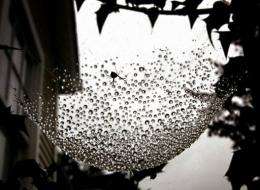Exposed: The strange sex life of spiders

Here's the good news: you are a male and you are allowed to have sex, at most, twice in your life. If that's the good news -- you may well ask -- what's the bad news? It's this: if you copulate for longer than 10 seconds, you get eaten by your sex partner. Thus is the challenge facing the male of the orb-web spider, Argiope bruennichi, according to a scientific paper published on Wednesday.
The tiny, common European spider is best known for the classic wheel-like web beloved of children's drawings.
But beneath this cosy exterior the species has a terrifying tradition of sexual cannibalism.
The males have a pair of mating organs, known as pedipalps, one of which they use for each copulation -- in other words, twice is their limit.
But females gobble up the much smaller males whenever they mate for longer than 10 seconds.
That means the male has to be pretty choosy about the fittest female on which he should confer his precious sperm. But which one?
Seeking to find out, Klaas Welke and Jutta Schneider of the Zoological Institute in Hamburg, Germany, nurtured spiders from eggs found in local meadows and fed the beasts on tasty morsels of fruitfly until adulthood.
"Only virgin spiders were used for the experiment," says the paper, reassuringly.
The spiders were then put to the test.
Males were put on a love couch either with a sister spider or an unrelated spider.
Time and again, males which were paired with a sibling copulated briefly, which meant they escaped cannibalism and lived to love another day.
But when they were paired with a non-sibling, the males' copulation went on for longer.
Yes, the males ended up getting eaten. But this way there was no risk of inbreeding, as there would be by having spiderlings with his sister.
That meant the spider had a better chance for his offspring to be healthy and to survive.
"This suggests that males can adaptively adjust their (sexual) investment relating to the compatibility of a female," says the paper, which appears in Biology Letters, published by Britain's Royal Society.
(c) 2010 AFP















